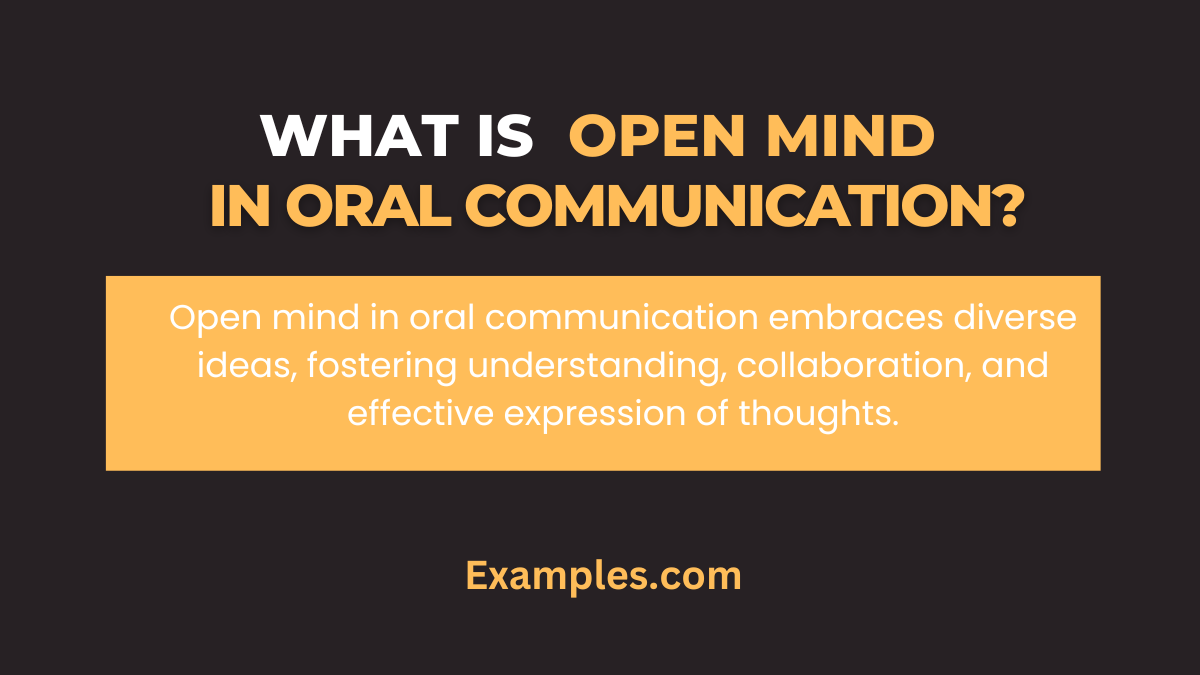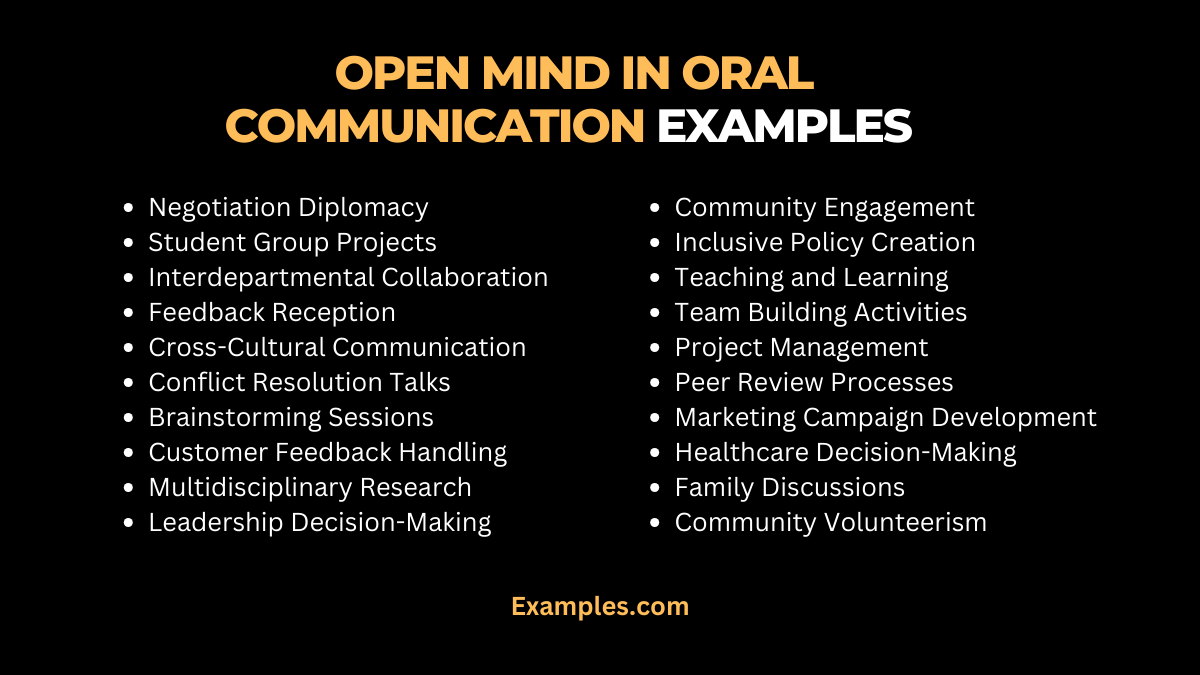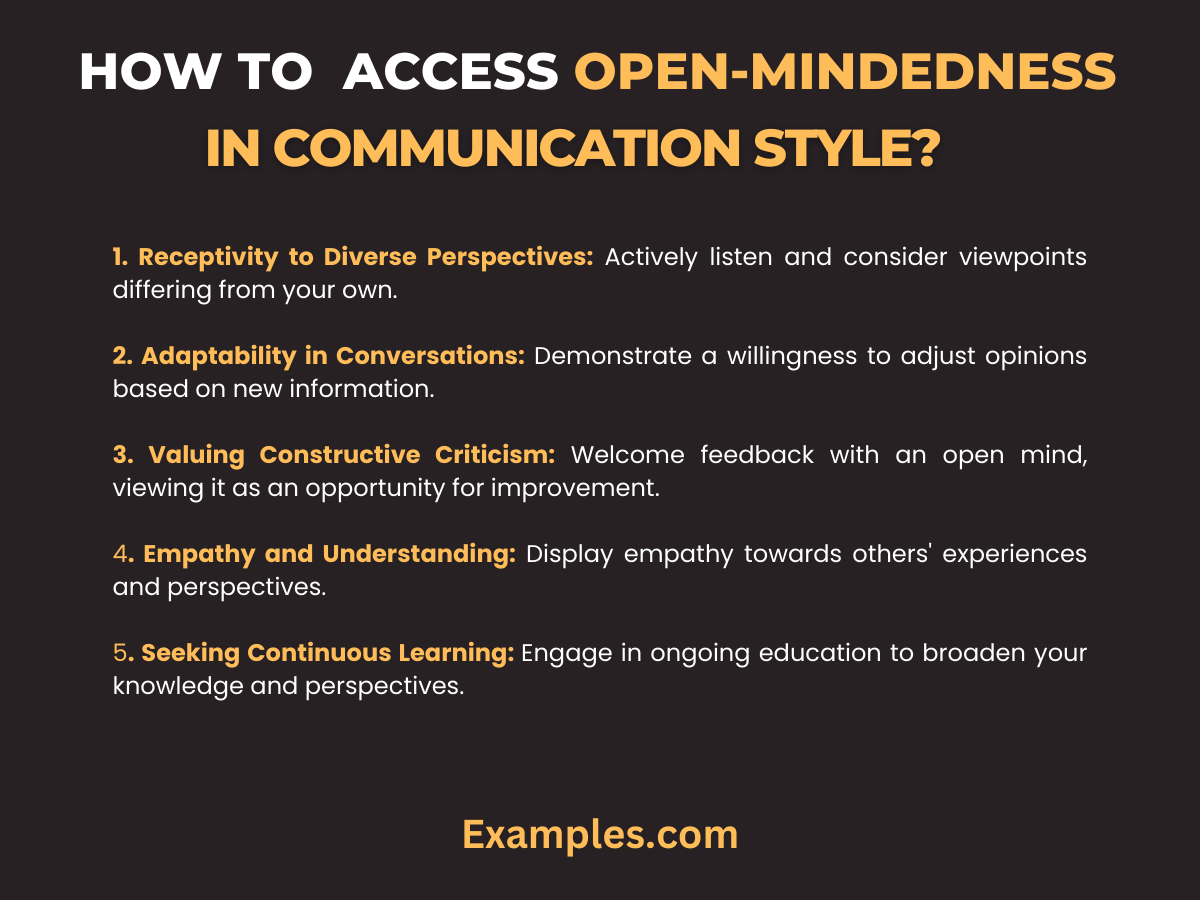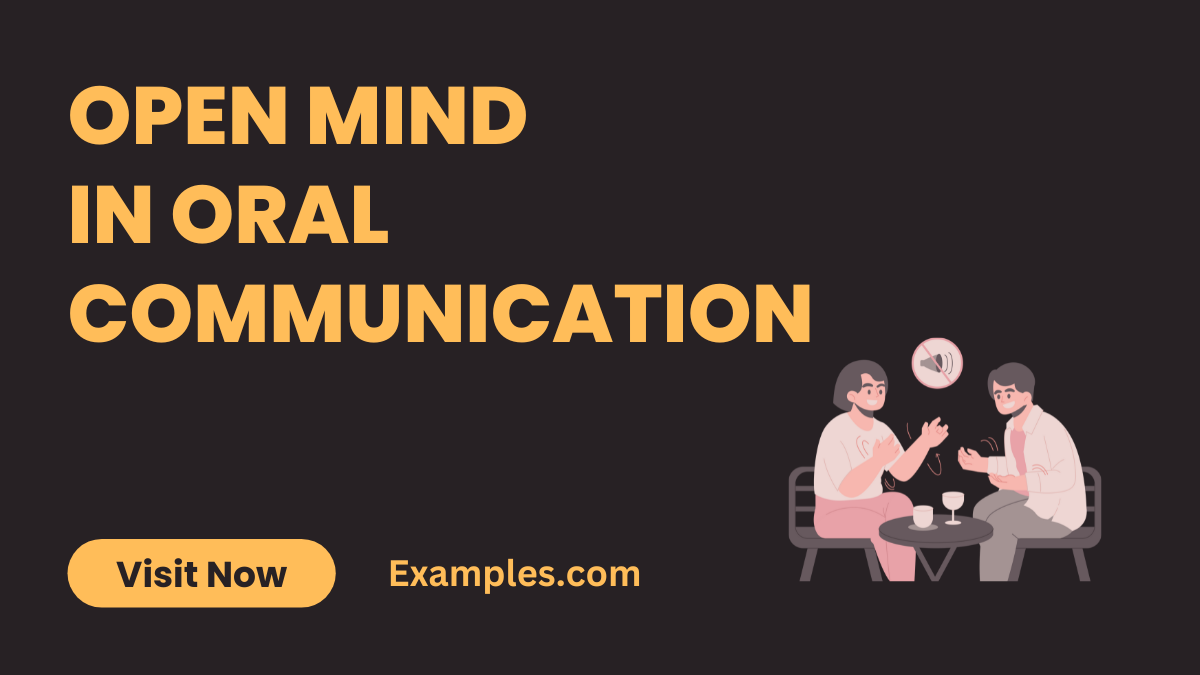19+ Open Mind In Oral Communication Examples
In the realm of effective communication, an open mind is a powerful asset. It involves receptivity to diverse ideas and perspectives, fostering a dynamic exchange of thoughts. Communication examples showcase adaptability and unbiased interaction, enriching the discourse.
What is Open Mind In Oral Communication?

An open mind in oral communication signifies a receptive attitude, valuing input from various sources. It transcends preconceived notions, promoting understanding and collaboration. In essence, it’s the key to harmonious and insightful conversations.
20 Open Mind In Oral Communication Examples

In oral communication, fostering an open mind is pivotal for effective interactions. Embracing diverse viewpoints encourages collaboration and creativity. Whether it’s navigating conflicts, receiving feedback, or engaging in team projects, an open-minded approach builds rapport and understanding. This inclusive communication style is evident in cross-cultural exchanges, brainstorming sessions, and leadership decisions. From community engagement to healthcare discussions, an open mind fosters connections, innovation, and harmonious relationships in various spheres of life. Adapt this approach to enrich your oral communication skills for a more impactful and empathetic discourse.
- Negotiation Diplomacy: Embrace an open mind during negotiations, seeking compromise for mutual benefit.
- Student Group Projects: Encourage diverse ideas in group projects, cultivating an open-minded learning environment.
- Interdepartmental Collaboration: Foster collaboration between departments, valuing varied perspectives for innovative solutions.
- Feedback Reception: Welcome constructive feedback openly, demonstrating a commitment to personal and professional growth.
- Cross-Cultural Communication: Embrace cultural differences, showcasing an open mind for effective cross-cultural interactions.
- Conflict Resolution Talks: Approach conflicts with openness, understanding opposing viewpoints for amicable resolutions.
- Brainstorming Sessions: Cultivate an open-minded atmosphere during brainstorming, allowing creativity to flourish.
- Customer Feedback Handling: Respond to customer feedback with an open mind, addressing concerns with empathy and solutions.
- Multidisciplinary Research: Excel in multidisciplinary research, integrating diverse perspectives for comprehensive insights.
- Leadership Decision-Making: Exhibit open-mindedness in leadership, considering varied inputs for well-informed decisions.
- Community Engagement: Engage with the community openly, valuing diverse opinions for impactful initiatives.
- Inclusive Policy Creation: Formulate inclusive policies, considering diverse needs and viewpoints for effective governance.
- Teaching and Learning: In education, foster an open-minded classroom, encouraging students to express unique perspectives.
- Team Building Activities: Promote open-mindedness in team-building exercises, enhancing collaboration and camaraderie.
- Project Management: Approach project management with an open mind, adapting strategies based on team input and insights.
- Peer Review Processes: Evaluate peers’ work with an open mind, providing constructive criticism for collective improvement.
- Marketing Campaign Development: Collaborate openly in marketing, ensuring campaigns resonate with diverse audience segments.
- Healthcare Decision-Making: Consider varied medical opinions for holistic healthcare decisions, reflecting an open-minded approach.
- Family Discussions: Navigate family discussions with openness, valuing each member’s perspective for harmonious relationships.
- Community Volunteerism: Contribute to community projects with an open mind, respecting diverse backgrounds and needs.
Open Mind In Oral Communication Examples at Workplace
In the workplace, an open mind fosters collaboration and innovation. Encourage diverse opinions, navigate challenges with adaptability, and value feedback for continuous improvement. Promote inclusivity, creating a positive work culture that engages diverse perspectives for impactful presentations and effective problem-solving.
- Team Collaboration: Actively listen to colleagues’ ideas, incorporating diverse perspectives into project planning for comprehensive solutions.
- Feedback Reception: Receive constructive feedback with gratitude, demonstrating openness to improvement and fostering a positive feedback loop.
- Decision Making: Involve team members in decision-making processes, appreciating varied inputs for informed and inclusive choices.
- Adaptability in Change: Embrace organizational changes with optimism, encouraging a smooth transition and inspiring a positive workplace atmosphere.
- Conflict Resolution: Approach conflicts with an open mind, seeking common ground and mutually beneficial solutions for sustainable resolutions.
- Inclusive Meetings: Encourage all team members to actively contribute during meetings, valuing their insights irrespective of hierarchies.
- Cross-Functional Collaboration: Promote collaboration between different departments, leveraging diverse expertise for holistic problem-solving.
- Project Debriefs: Conduct open discussions after project completion, analyzing successes and areas for improvement collectively.
- Training Sessions: Facilitate open discussions during training sessions, promoting knowledge sharing and interactive learning.
- Employee Suggestions: Implement an open-door policy for employee suggestions, fostering a culture where diverse ideas are acknowledged and valued.
Open Mind In Oral Communication Examples for College Students
In academics, an open mind enhances learning by engaging in discussions and valuing peers’ contributions. Embrace diverse perspectives in debates, utilize feedback for improvement, and foster inclusivity in student organizations for collective success.
- Classroom Discussions: Participate actively in class discussions, considering diverse opinions to broaden your knowledge base.
- Group Projects: Collaborate openly in group projects, acknowledging and integrating varied ideas for a well-rounded outcome.
- Debates and Presentations: Present well-researched arguments with an open mind, responding thoughtfully to counterpoints during debates.
- Feedback Integration: Use feedback from professors to refine your academic approach, fostering a mindset of continuous learning and improvement.
- Research Collaborations: Engage in research collaborations, valuing different research methodologies and insights for comprehensive outcomes.
- Club Leadership: Lead student clubs with an inclusive mindset, recognizing and utilizing the diverse skills of club members.
- Peer Tutoring: Approach peer tutoring sessions with patience and openness, catering to diverse learning styles for effective assistance.
- Internship Experiences: Embrace various perspectives during internships, adapting to different work cultures and methodologies.
- Extracurricular Events: Organize inclusive events that celebrate diverse cultures, fostering a sense of belonging among students.
- Interdisciplinary Studies: Explore interdisciplinary studies, integrating knowledge from various disciplines for a holistic academic approach.
What does keeping an Open Mind in a Conversation Style Show?
Maintaining an open mind in conversation demonstrates receptivity to diverse ideas, fostering a collaborative and inclusive environment. It reflects adaptability, empathy, and a willingness to embrace different perspectives, enhancing the overall quality of communication.
How can you assess Open-mindedness in your Communication Style?

Open-mindedness is evident in a communication style that welcomes diverse opinions, actively listens without judgment, and considers alternative viewpoints. Assess by observing receptiveness to feedback, adaptability to change, and a genuine curiosity to understand various perspectives.
- Receptivity to Diverse Perspectives: Actively listen and consider viewpoints differing from your own.
- Adaptability in Conversations: Demonstrate a willingness to adjust opinions based on new information.
- Valuing Constructive Criticism: Welcome feedback with an open mind, viewing it as an opportunity for improvement.
- Empathy and Understanding: Display empathy towards others’ experiences and perspectives.
- Seeking Continuous Learning: Engage in ongoing education to broaden your knowledge and perspectives.
Tips and Benefits for Effective Open Mind In Oral Communications
- Active Listening: Listen attentively without preconceptions.
- Embrace Diversity: Value and seek diverse opinions.
- Adaptability: Be open to change and new ideas.
- Constructive Feedback: Welcome feedback for continuous improvement.
- Inclusivity: Create a positive environment valuing diverse perspectives.
In conclusion, the practice of maintaining an open mind in oral communication is not just beneficial, but essential in our increasingly interconnected world. This approach fosters a culture of mutual respect and understanding, essential in both personal and professional settings. By valuing and considering diverse perspectives, individuals and organizations can cultivate a more inclusive, innovative, and collaborative environment. This is particularly crucial in a world where cultural diversity and global interconnectedness are the norms. For further insights on the importance of open-mindedness in communication, particularly in diverse environments, the Harvard Graduate School of Education offers valuable perspectives on celebrating differences and fostering an inclusive culture.
Moreover, embracing an open mind in communication not only enhances interpersonal relationships but also contributes significantly to personal growth and learning. It allows individuals to broaden their horizons, challenge their own biases, and develop a more well-rounded understanding of the world around them. Educational institutions like Stanford University emphasize the role of open-mindedness in enhancing learning experiences, particularly through arts and culture. These resources underscore the transformative power of open-mindedness in shaping not just effective communicators, but well-rounded individuals capable of thriving in a diverse and ever-changing world.



